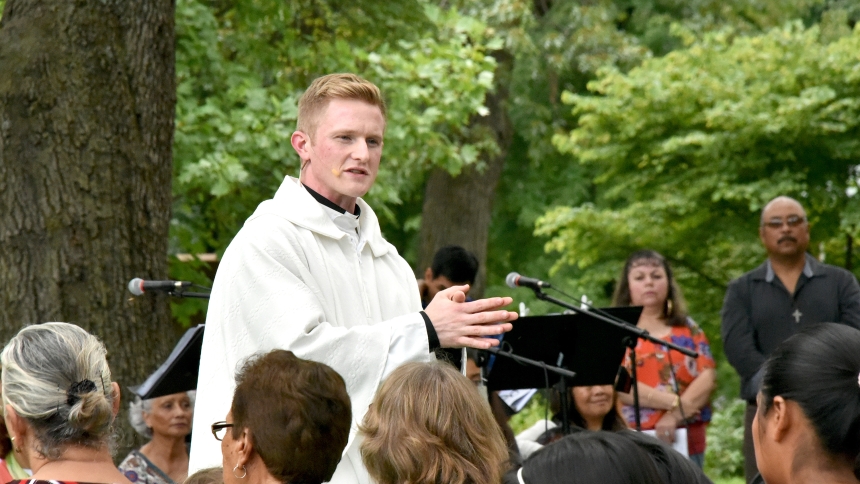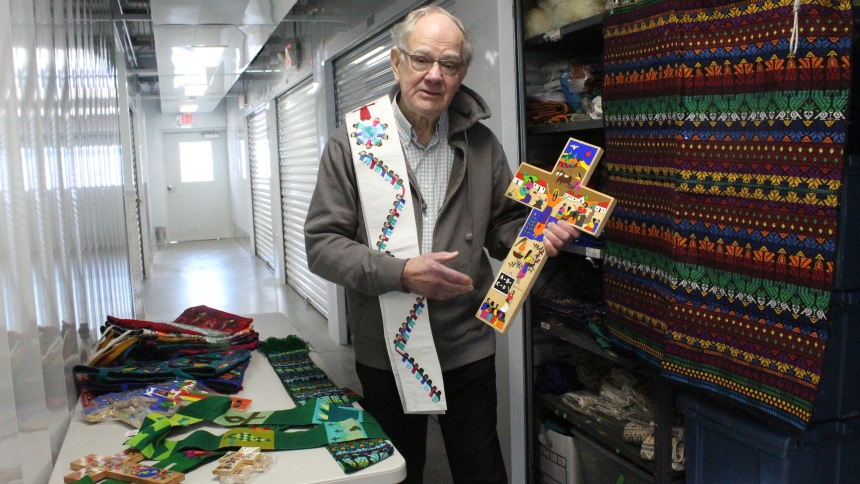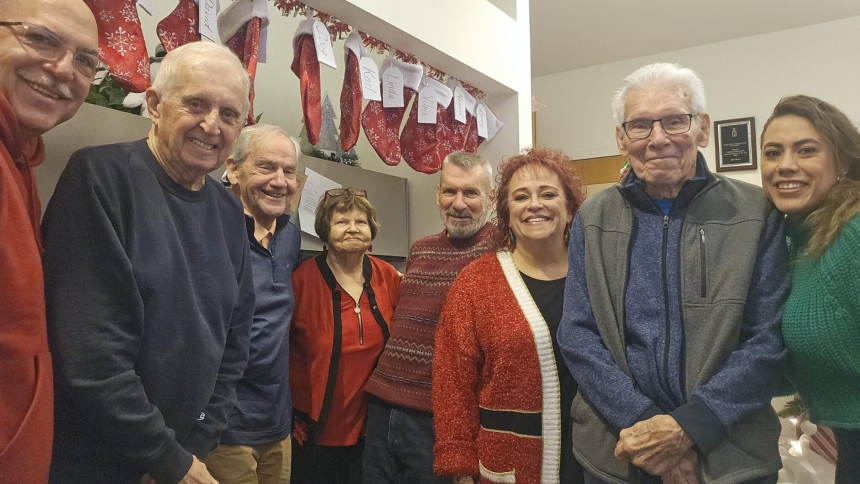
LAPORTE – Long before the poignant poem “Footprints” illustrated the accompaniment of the Lord, Scripture told of a “kind and merciful” God, and a savior whose “yoke is easy.” As human beings are unlikely to consistently uphold all the commandments, Jesus makes the journey one in which His people can look toward the goal, rather than becoming identified by sin.
Ministering to the people of LaPorte, Father Nathaniel Edquist and the deacons serving Holy Family Parish support the sacramental life of Catholics. One such channel of grace, and a ministry exclusive to a priest, is confession, which offers an opportunity for the examination of conscience and the “objective and subjective” reality of the forgiveness of sins.
Invariably, as the faithful are drawn to deeper prayer and conversion during the Lenten season, many participate in confession. One of the ways of attaining a clean heart is through availing oneself of the “repeatable sacrament” that has a “spontaneity” about it. Father Edquist spoke about reconciliation during a March 28 interview.
“You mentioned people being in the habit of regular confession. Speak about the approach of parishioners and how the mercy of God is powerful stuff,” asked Alonzo.
“As a priest, sometimes you sit in the confessional box and you’re often hearing the confessions of those who regularly take advantage of the sacrament,” said Father Edquist. “And then all of the sudden, someone comes in who has not been to the sacrament in decades, and you kind of jump a little bit, because you are addressing that in the same way – meaning that the mercy of God is there, but at the same time, you’re acknowledging that this person needs a little bit more of an intimate encounter with the Lord, and a little more reassurance, based on what they’re bringing.”
Whether it be those frequent penitents with the “same laundry list” of sins that they are struggling with, or one who, after a long time, turns back to God seeking to be made whole again, the sacrament is characterized by, “Number one, the reality of the mercy of God and how important that is in spite of human sinfulness, because so often people think that God couldn’t possibly forgive that thing that I did or God can forgive these things but I’m still hopeless because I’m still suffering from it,” he said.
Some people, Father Edquist explained, “are weighed down by shame,” or wonder when, “God is finally going to give up on me, or has He already?” Better than feeling shame or allowing oneself to be characterized by sinful behavior, admitting guilt is a first step. It is a “legal term” that may eventually start the process of someone reforming their life.
“If you’re in a court of law, you’re either guilty or not guilty based on evidence; guilt is not a feeling, it is an objective measurement,” he explained. “In a court of law, guilt is a good thing because it helps you determine who is responsible for something – you acknowledge responsibility, so you're not pawning off your responsibility to somebody else.”
Since Jesus wishes that no one is lost, faithful believe in Him, strive to keep his commands, and, as St. Paul shows in his example, “Brothers and sisters, I for my part do not consider myself to have taken possession. Just one thing: forgetting what lies behind but straining forward to what lies ahead, I continue my pursuit toward the goal, the prize of God’s upward calling, in Christ Jesus.” (Phil 3:13-14)
“Jesus has already paid the price for us – and I simply take part in that by doing penance ... little acts of penance and self-sacrifice throughout that day to unite to the eternal sacrifice that Christ Himself made,” the LaPorte priest said.
“This leads to me (committing) to a firm purpose of amendment, so if I’ve been guilty of a crime and I have to go to jail, ideally incarceration will lead me to a better life, to not do (the crime) again … Human nature doesn't work that way, often, so I have to keep learning over and over again.”
Shame is a quick route to chaos in one’s soul, according to Father Edquist: “Shame is always about an emotion, a feeling.”
He continued, “On social media culture there has been a lot of terminology surrounding shaming, as in you shame someone for saying something many, many years ago for something that has fallen out of favor with a modern audience’s sensibilities, so you want to make them feel bad about it. Shame is never a good thing because it never really brings you to a better place like guilt does.
“In the spiritual life, shame is kind of the devil saying to you, you are guilty of committing this sin, and now I’m going to identify you with your sin, and that’s who you are,” explained Father Edquist. “You’re a bad person … not a child of God.”
Jesus commissioned his ministers to “forgive men’s sins,” as recorded in John 20:21-23. “With confession itself, the sacrament has both an objective and a subjective nature, right? So, the objective nature is that when you've confessed your sins, the mercy of God takes that away,” Father Edquist explained.
“The nature of God's mercy takes away the guilt that you objectively incurred and then, you know, the subjective nature of confession makes you feel better and no longer ashamed from the subjective nature of feeling ashamed.”
Reconciliation is the complete spiritual remedy.
“Confession is meant to address both of those, like both guilt and shame, to remind the sinner that you're still a child of God,” Father Edquist concluded. “You are really loved by God and in no way should confession ever shame someone. In some ways, it should convict.”
“It’s kind of like a phrase, and a book, by Archbishop Fulton J. Sheen, ‘Peace of Soul.’ Another way of looking at the easing of a burden, one hears many people quote Matthew 11, where Jesus says his burden is light. Have you preached about this?” asked Alonzo.
“So, Matthew 11 is often chosen as a gospel for a funeral homily. And, of course, as we know from the agricultural images of Jesus’ day, He would have spoken to a crowd that would have immediately understood this, that a yoke was meant to have two animals, two oxen.”
Father Edquist continued, “Obviously, if there's only one oxen trying to be in this yoke and to pull the plow behind him, he's either gonna go in circles because he doesn't have the counterweight on the other side to make sure they keep going straight, or he's gonna be just trying too hard … and get exhausted.
“So, when Jesus says, take my yoke upon you … it's not like there is no yoke and you won't have any burden, but it's light. Now when you step in the yoke next to Him … We can carry it alongside each other.”
In prayer, and formally in the sacrament of reconciliation, the spirit is communication. In today’s modern society, with smart devices drawing people to swipe or virtue signal instead of talk, a visit with a confessor, a priest of Christ, can remind the faithful of the Lord’s faithfulness.
“The natural tendency is to feel like we’re alone, and so people have to know that Christ is there to carry your burden along with you,” Father Edquist said. “Let him relate to you, walk along (in) those difficult times with you so that you're not just at it all by yourself, because he's right there next to you.”
Caption: Father Nathaniel Edquist (top), vocations director and pastor of Holy Family Parish, delivers his homily alternating between English and Spanish to those attending the Mass for migrants at Herr Farms in Lowell in this file photo. The LaPorte priest believes that God draws His people to be reconciled with Him, and a sure may for the sinner to remain in a state of grace is through regular sacramental confession. (NWIC file photo/Anthony D. Alonzo)



